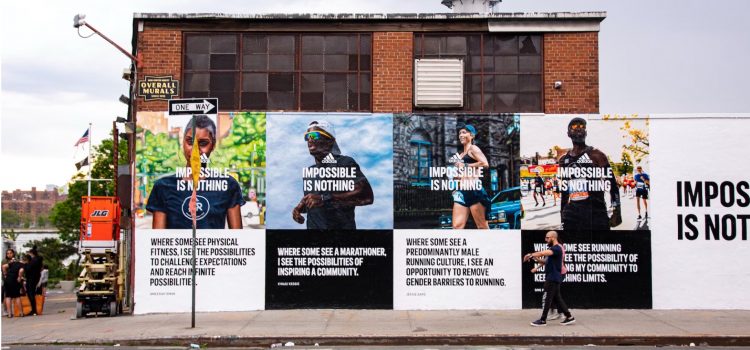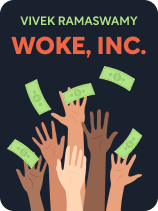

This article is an excerpt from the Shortform book guide to "Woke, Inc." by Vivek Ramaswamy. Shortform has the world's best summaries and analyses of books you should be reading.
Like this article? Sign up for a free trial here.
What is the woke industrial complex? Why is it damaging? How do experts suggest we solve it?
In Woke, Inc., entrepreneur Vivek Ramaswamy discusses the woke industrial complex in which American corporations hide their corruption and greed behind the virtue signaling of liberal values. He argues that this polarizes citizens and concentrates political power in the hands of a small group of corporate elites.
Read on to learn Ramaswamy’s five ways to solve the woke industrial complex in our society.
Solving the Woke Industrial Complex
Entrepreneur Vivek Ramaswamy believes the antidote to the woke industrial complex, or Wokenomics, is a paradigm shift. He believes that Americans need to redefine strong values so that they cannot be influenced by wokeness or any other political ideology in the future. Ramaswamy paves the road to reclaiming our political power with five actionable solutions.
#1: Revise Section 230
Ramaswamy argues that if we don’t limit the unique privileges granted to tech companies, those companies will essentially function as a shadow government ruling over the free speech of American citizens. To do this, he says we should restructure The Common Decency Act (CDA), which was established in 1996 to prevent minors from accessing pornographic material on the internet but has ended up giving tech companies unusual powers of censorship in addition to unusual freedom from liability.
Under Section 230 of the CDA, if a user posts explicit content on social media, the tech provider for that website can neither be held liable for the post nor sued for removing it. This protection gives them enormous power: They can both permit and remove content as they like with no repercussions. Ramaswamy argues that this gives tech companies the power to interpret our laws and censor our citizens according to their own guidelines, which may or may not align with official legal guidelines.
Ramaswamy’s solution to this particular issue of the woke industrial complex is to make an amendment to Section 230 in which social media companies have to choose between one of the two legal protections. If they choose to moderate people’s opinions, they’ll then be liable for the spread of illegal content—in other words, if they’re going to remove problematic content, they must commit to removing all problematic content. If, on the other hand, they choose to allow complete freedom of speech, then they can’t remove any content that they decide doesn’t fit their guidelines—but they’ll be protected from litigation.
(Shortform note: The debate over Section 230 is a hot topic in conservative circles, and party members are divided on whether or not to revise the legislation. Some agree with Ramaswamy, believing that the revisions proposed would pressure media companies to create fairer and more transparent user guidelines. Others argue that as Big Tech companies are a part of the market, the government would be overstepping in trying to further regulate how they run their business. People on this side of the debate maintain that when censoring users’ voices becomes unprofitable, then these companies will stop on their own.)
#2: Consider Political Affiliation as Freedom of Religion
Ramaswamy argues that free speech can be strengthened by adding political affiliation to the freedoms protected by the First Amendment. He writes that since political affiliation is such a predominant part of people’s identities and how they live their lives, it’s equivalent to following a religion. Thus, just as religion is protected, people should not be discriminated against based on how they define themselves politically.
| Not IRS-Approved A person’s political leanings can impact their perspective of the world and how they choose to live their life, but there are more conditions that need to be met before a belief system can be recognized as a religion. The Internal Revenue Code (IRS) determines the tax status of organizations such as nonprofits and churches, and political affiliation does not meet many of the qualifications for religious protections and exemptions: – Political parties don’t have a distinct creed and structure of worship. Neither the liberal nor conservative parties can claim universal principles or a uniform way in which those principles are applied in practice. – Political parties don’t have a sacred text that outlines the rules of their doctrine. – Political parties don’t have ordained ministers. We elect representatives to communicate our interests in the federal government. It’s not general practice for the leaders of a political party to preach what to believe to their constituents. |
#3: Mandate Community Service
To combat the cultural issue of the woke industrial complex, Ramaswamy suggests a national community service mandate in which all adolescents must participate during their four summers of high school. Ramaswamy notes some benefits this would provide, such as combating the summer retention deficiency students face and generating a sense of patriotism similar to countries that mandate military service. The most important part of his idea, though, is the role it plays in shifting the paradigm of the woke industrial complex.
He notes that currently, many students do community service as resume boosters, but Ramaswamy considers this a form of virtue signaling. However, if all students participated in community service, young people could focus on actually helping their communities instead of getting a competitive advantage. They might find causes that they genuinely care about and continue to support these causes themselves instead of handing the responsibility over to a corporation.
| Community Service Isn’t Free While few would argue against the benefits of young people getting involved in their communities, people in the world of education have doubts as to how such a mandate would be enforced. Such responsibility would most likely fall on schools, which range drastically in the amount and quality of resources each district has. Without addressing inequities in the education system, a community service mandate risks creating yet another means of power imbalance. Students cannot volunteer without necessary resources. To participate in such a program, students would need access to things like transportation and a safe place in the community to serve. Mandated community service programs would also be a financial hardship for students who must work over the summer to support their families, and they would disadvantage students who participate in summer programs like sports or band in efforts to win non-academic scholarships. |
#4: Replace Critical Race Theory With Critical Diversity Theory
Since Critical Race Theory and the diversity training it inspires are connected to the woke industrial complex, Ramaswamy proposes the development of Critical Diversity Theory (CDT). CDT would entail collaboration between academics and corporations to create new assessments for determining diversity. Diversity under CDT would measure different experiences and ways of thinking instead of inherited traits like skin color and sex. CDT would also allow flexibility for companies to define which diverse traits are important to them. For example, some companies may want diversity of thought when it comes to creativity but not when it comes to punctuality.
| Why the Name Matters Although Ramaswamy argues that CRT should be replaced by CDT because CRT promises to fix what he claims is a false problem (ingrained racism affecting all aspects of American life), data does support the principle tenet of CRT that unexamined racism leads to unfair inequalities. The Justice Department’s recent attempt to eradicate racial bias from legal practice exemplifies how ingrained racism can be. Pattern is an artificial intelligence (AI) program created to impartially assess how likely a prisoner is to repeat a crime and their level of risk returning to society. Ultimately, the AI began to duplicate the discrimination of its human predecessors, disproportionately marking Black and Brown people as high risk and prohibiting their release. The American Civil Liberties Union (ACLU) warned criminal justice systems against relying on AI, as people can pass on their bias to the algorithm. While merging all differences as diversity is inclusive, activists emphasize the importance of being specific in terminology when trying to solve complicated problems like racism. |
#5: Entrust Social Issues to Non-Profits
To ultimately end the woke industrial complex, Ramaswamy says that all social issues should be relegated to nonprofits and government organizations, leaving capitalist entities completely apolitical. For this to work, he explains that Americans must have faith that companies with no political influence will naturally come to align themselves with our social values.
Let’s use vapes to illustrate this idea. Although many had hoped that vaping would reduce nicotine addiction among young people, studies are beginning to show that it actually increases addiction. Woke consumers may be tempted to fix this issue by demanding that companies make socially responsible changes like removing the version sold to teens or starting ad campaigns advocating for teen health. However, companies aren’t going to want to lose a large portion of their consumer base and will probably resort to shady tactics to keep marketing to young people anyway.
Ramaswamy claims that if consumers put their money toward nonprofits—for example, ones that educate and assist teens who vape—we have a greater chance of raising a generation of young people who will do the right thing, like having no desire to vape. Thus, the vaping companies of this example would come to a natural end.
| Necessary Changes to Nonprofits Experts note that if our society is to rely on nonprofits to promote social change, there must be measures in place to prevent fraudulent or ineffective use of resources. Harvard business professor Regina E. Herzlinger recommends a system in which nonprofits: – Must make their financial statements transparent to the public. – Are assessed for the quality and quantity of community efforts. – Have sanctions applied if they fail to disclose their records or misuse donations. |

———End of Preview———
Like what you just read? Read the rest of the world's best book summary and analysis of Vivek Ramaswamy's "Woke, Inc." at Shortform.
Here's what you'll find in our full Woke, Inc. summary:
- Tactics companies use to influence legislation and manipulate consumers
- How "Wokenomics" is weakening democracy
- Five solutions to counter wokeness






